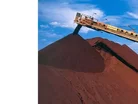Rio Tinto on track for $2.6 billion Gudai-Darri ramp up

The $2.6 billion Gudai-Darri replacement iron ore mine in Western Australia is progressing with production ramp-up on track for early 2022, according to Rio Tinto's Annual Report 2020.
The first phase of Gudai-Darri will have a 43Mt annual capacity, underpinning production of the Pilbara Blend.
Amid rising scrutiny on low-carbon operations and sustainability, work will begin on a 34MW solar plant, comprising around 100,000 solar panels, this year. The plant is expected to supply all of Gudai-Darri’s electricity demand during peak solar power generation times and approximately 65% of the mine’s average electricity demand.
Set to be one of the world’s most automated mines, Gudai-Darri’s autonomous fleet will include the world’s first autonomous water carts, to be launched in 2021. Delivered through a partnership with Caterpillar, the water carts will join its autonomous heavy mobile equipment fleet including haul trucks and autonomous drills.
The focus on sustainability is also designed to alleviate pressure on the company following the destruction of the rock shelters at Juukan Gorge, in which Rio Tinto acknowledged it must do better and its employee pride had been eroded. It has earmarked $50 million to attract, retain and support indigenous employees across Australia. The Yandicoogina mine, Pilbara, is pictured.
Product-specific results were as follows:
· Iron Ore $27.5 billion gross sales, $18.8 billion underlying EBITDA
· Aluminium $9.3 billion gross sales, $2.2 billion underlying EBITDA
· Copper & Diamonds $5.4 billion gross sales, $2.2 billion underlying EBITDA
· Energy & Minerals $5 billion gross sales, $1.6 billion underlying EBITDA
Three criteria need to be met in order for the Oyu Tolgoi copper project can start this year; chiefly outstanding government approvals, funding as agreed with Turquoise Hill Resources (TRQ) in an MoU in September 2020, and achieving power milestones agreed with the Government of Mongolia in June 2020.
On January 4, the government advised Rio Tinto that they were "dissatisfied with the results of the definitive estimate and the funding implications for the sharing of economic benefits between the shareholders of Oyu Tolgoi".
The report detailed a £7.2 million payment to ousted Chief Executive Jean-Sebastien Jacques last year, and eligibility for future share bonuses, which are worth up to £28 million at current prices.
Chairman Simon Thompson said Jakob Stausholm inherits a company "that urgently needs to restore trust with host communities and in our management of cultural heritage".
Gender diversity is another key focus in 2021 with women comprising only about 20% of Rio Tinto's workforce.
Capex rose 13% to $6.2 billion and the company ended 2020 with net debt of $0.7 billion. To read more on last week's results, click here.
- Rio Tinto eyes Arcadium Lithium in Battery Metals MoveOperations
- Focus on: Nickel, a key metal in the EV revolutionSupply Chain & Operations
- Why Nickel Price Slump has hit BHP so HardSupply Chain & Operations
- The Battle for Control of Rare Earth Minerals Supply ChainSupply Chain & Operations



